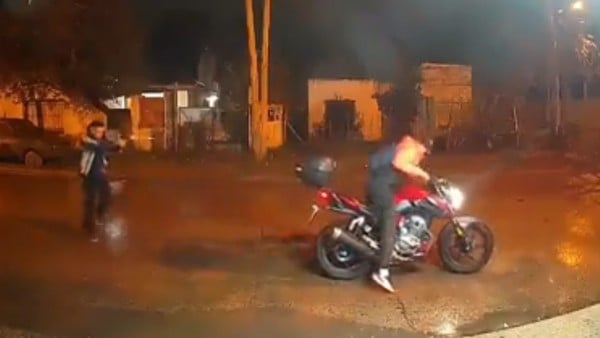Global Courant 2023-05-24 05:07:37
Once again, a case of insecurity once again divides society. The technicalities of the law are not exempt from interpretations.
The sequence was recorded in HD. In times of VAR and detailed analysis of each conduct that has a public impact, the case of the policeman who killed the motochorro who stole his motorcycle in Moreno was immediately a matter of debate. If he acted in legitimate defense, in the line of duty or if it was a case of “justice into his own hands” and police abuse. The crack did not take long to appear and neither did politics. The policeman was released on Tuesday afternoon but the discussion about his actions at the judicial level will continue until the oral trial.
During the robbery, which occurred on Sunday at 8:32 p.m. in La Reja, Moreno, the Buenos Aires sergeant handed over his motorcycle to the thief and while he got on, the agent took a few steps away, took his weapon from his waist and hit him four times. shots in the back.
The case does not have many similar precedents, despite the references that flew over the conversation in the media and networks, such as that of the policeman Oscar Chocobar who went out to help a tourist who was being attacked with knives, he chased the thief to try to stop him, there was a chase and he killed him; or like that of the butcher Daniel Billy Oyarzún who, after the robbery at his business in Zárate, went out behind the motorcycles, ran over them with the car and killed one of them. He doesn’t end up looking quite like one or the other.
Two lawyers specialized in criminal law and with experience in homicide cases that had police officers as perpetrators gave Clarín their view of the case.
For the lawyer Fernando Soto, who defended Chocobar in the trial for killing the thief Pablo Kukoc in La Boca in 2017, the Moreno policeman acted in “the line of duty”, in “defense of his life and that of his girlfriend” and “in flagrante”.
On the other side, Margarita Jarque, a lawyer for the Provincial Commission for Memory (CPM) who was a plaintiff in the Monte Massacre for which four police officers have already been convicted, said that the case “seems to be framed as a case of ‘justice for own hand'” and “abusing the police function.
Soto says that a 1990 United Nations agreement to which Argentina adheres establishes that “security force officials must identify themselves out loud, unless according to the circumstances of the case it is inappropriate or useless. In this case it was obvious that it was useless.” Also, says Soto, that although “the use of weapons is the last resort, they are authorized when one’s health is in danger or when one’s own life or that of third parties is at stake.”
In the case of Moreno, for Soto, “although it seemed that there was no danger, at that moment the policeman did not have the conditions to assess him and if the thief or his accomplice turned around, the policeman no longer had time to react.” And he recalled the case of a City police officer who killed a motorcycle that robbed a Chinese supermarket when he was already running away, after hearing “Kill her, kill that son of a bitch!” “The court acquitted her because she feared imminent danger. They could turn around and kill her,” she said.
For his part, Jarque considered that when the policeman fired “he had already gotten off the motorcycle, the event had happened, the subject was leaving, with his back turned, so legitimate defense and, even less, excess, does not seem to be configured.” “. For the lawyer “it does not seem to emerge from the images a justification for acting in the line of duty, at the time of shooting, since the risk had ceased, there was apparently no exchange of shots nor was the policeman being targeted at the time of shooting 4 times”.
Another point of debate is whether the police acted flagrantly or not. For Soto it was like that. “The crime was robbery with weapons. That was happening at the time he fired. It’s not that hours later he saw that he didn’t have his motorcycle. That’s called in flagrante.” Jarque was emphatic: “The flagrante delicto enables the arrest, but not the homicide.”
MG








